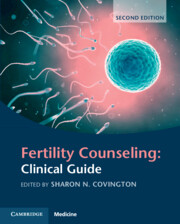Book contents
- Fertility Counseling: Clinical Guide
- Fertility Counseling: Clinical Guide
- Copyright page
- Dedication
- Contents
- Preface
- Contributors
- I Introduction
- Chapter 1 Collaborative Reproductive Healthcare Model
- Chapter 2 Reproductive Psychology and Fertility Counseling
- II Therapeutic Approaches
- III Third Party Reproduction: Assessment and Preparation
- IV Addressing the Needs of Diverse Populations
- V Special Topics in Fertility Counseling
- VI Practice Issues
- The International Glossary on Infertility and Fertility Care, 2017
- Index
- References
Chapter 2 - Reproductive Psychology and Fertility Counseling
from I - Introduction
Published online by Cambridge University Press: 24 November 2022
- Fertility Counseling: Clinical Guide
- Fertility Counseling: Clinical Guide
- Copyright page
- Dedication
- Contents
- Preface
- Contributors
- I Introduction
- Chapter 1 Collaborative Reproductive Healthcare Model
- Chapter 2 Reproductive Psychology and Fertility Counseling
- II Therapeutic Approaches
- III Third Party Reproduction: Assessment and Preparation
- IV Addressing the Needs of Diverse Populations
- V Special Topics in Fertility Counseling
- VI Practice Issues
- The International Glossary on Infertility and Fertility Care, 2017
- Index
- References
Summary
This chapter provides an overview of the psychology of infertility as an aspect of reproductive psychology, and the field of fertility counseling.The changing role of reproduction in modern society is reviewed.Major theories related to reproductive psychology, including grief and loss, stress and coping, as well as posttraumatic growth are discussed. Additionally, the history of infertility counseling is described. The US and international guidelines for the provision of psychological services, both assessment and counseling, are provided.The formats for the provision of clinical care are discussed and the clinical research on the impact of psychological services is reviewed. The qualifications for mental health professionals practicing as fertility counselors are also included.
Keywords
- Type
- Chapter
- Information
- Fertility Counseling: Clinical Guide , pp. 31 - 38Publisher: Cambridge University PressPrint publication year: 2022

